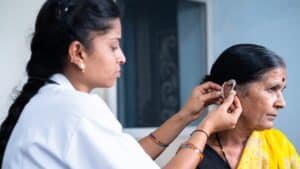
As we age, our bodies undergo various changes, and one of the most common issues that affect older individuals, especially women, is hearing loss. Hearing loss is a pervasive problem among the elderly population, and it significantly impacts emotional, social, physical and cognitive health.
In this article, we will explore the unique healthcare challenges faced by older women in relation to hearing loss and how healthcare providers, families, and society can better support them.
Unique Healthcare Challenges for Older Women with Hearing Loss
Across the globe, some of the challenges associated with hearing loss include:
Prevalence
Hearing loss is the single most common neurological problem afflicting older adults. The prevalence of hearing loss increases with age, so the aging population poses a significant challenge in terms of healthcare resources and services.
Diagnostic Delays
Many individuals with hearing loss experience delays in diagnosis and treatment. This can be due to various factors, including a lack of awareness about the signs of hearing loss, stigma associated with hearing aids, and limited access to hearing healthcare professionals.
Access to Services
Access to hearing healthcare services, including audiology and prescriptive hearing technology, can be limited, especially in rural areas. Long waiting times for appointments and treatment can exacerbate the impact of hearing loss on individuals’ quality of life.
Cost of Hearing Aids
There can still be a significant cost associated with hearing aids and related services for those who do not qualify for support. This can create financial barriers to treatment. But keep in mind that a reputable audiologist will always focus on access and affordability, without compromising your healthcare.
Awareness and Education
Many people are not aware of the causes, and most do not understand the dire consequences of living with untreated hearing loss. Raising public awareness and improving education about hearing health is a challenge that we must meet. Untreated hearing loss can increase the risk of a traumatic fall, loss of independence and may increase the risk of cognitive decline and dementia.
Workplace Accommodations
Ensuring that workplaces provide accommodations for employees with hearing loss, as required by law, can be a challenge. Employers may not always be aware of their obligations or may be reluctant to make necessary adjustments.
Social Isolation
Hearing loss can lead to social isolation and mental health issues if not addressed promptly. This can put additional strain on healthcare and social support systems.
Technological Advancements
Keeping up with rapidly evolving hearing aid technology and assistive devices can be a challenge for both healthcare providers and individuals with hearing loss. Ensuring access to the latest and most effective solutions is important.
Quality of Care
Variations in the quality of audiology services and aftercare can impact the effectiveness of interventions for hearing loss. Ensuring consistent high-quality care across any country is a challenge.
Research and Funding
Research into the causes and treatments of hearing loss requires funding. Securing sufficient funding for research initiatives is also a challenge.
What We See Across the Globe
The United Kingdom
The UK government, healthcare providers, advocacy groups, and charitable organizations are actively working to address these challenges through policy changes, awareness campaigns, and improved access to services. Nonetheless, hearing loss remains an ongoing healthcare concern in the UK and globally.
Canada
The Canadian government, provincial and territorial healthcare systems, advocacy groups, and charitable organizations are actively working to address these challenges through policy changes, awareness campaigns, and improved access to services. Nevertheless, hearing loss continues to be a significant healthcare concern in Canada, and efforts to address it are ongoing.
New Zealand
Public healthcare systems in New Zealand can have long wait times for hearing assessments and treatments. This can lead to delays in receiving necessary care, potentially worsening hearing conditions.
South Africa
The challenge can be even greater in South Africa. Many South Africans, especially those in rural and underserved areas, face challenges in accessing healthcare services, including hearing healthcare. This limited access makes it difficult for individuals with hearing loss to receive timely diagnosis and treatment.
In addition, South Africa faces a shortage of audiologists and ear specialists, which results in long waiting times for appointments and limited availability of specialized care for hearing disorders.
Efforts to address these challenges include government initiatives, NGO programs, and international collaborations aimed at improving hearing healthcare in South Africa. These efforts may involve increasing the number of trained professionals, raising awareness, improving access to affordable hearing aids, and strengthening early intervention programs, among others.
Australia
In Australia, The COVID-19 pandemic has accelerated the use of telehealth services in healthcare, including audiology. Ensuring that individuals with hearing loss can access and benefit from telehealth services is an evolving challenge.
Additionally, Indigenous Australians experience higher rates of hearing loss compared to the non-Indigenous population. Addressing hearing health disparities in Indigenous communities is a significant challenge.
India
In India, high levels of noise pollution in urban areas contribute to hearing loss. Occupational noise exposure, as well as noise from traffic and construction, can be significant factors. There is a need for more comprehensive hearing screening programs, especially for newborns and young children. Early detection and intervention can significantly improve outcomes for children with hearing loss.
It’s worth noting that healthcare challenges related to hearing loss are not unique to any of these countries and are encountered in most countries around the world. Efforts to improve hearing health outcomes often require collaboration among healthcare professionals, government agencies, advocacy groups, and the community.
Supporting Older Women with Hearing Loss in Healthcare
Older women who are dealing with healthcare challenges related to hearing loss can benefit from a combination of medical care, assistive devices, lifestyle adjustments, and emotional support. Here are some tips to help you manage your healthcare challenges effectively.
Consult an Audiologist or ENT Specialist
Start by scheduling an appointment with an audiologist. They can diagnose the extent and cause of hearing loss and recommend appropriate treatments.
Regular Hearing Tests
It’s essential to have regular hearing tests to monitor any changes in hearing loss and to adjust treatment plans accordingly.
Prescriptive Hearing Aid Technology
If hearing loss is moderate to severe, consider using hearing aids. Consult with a hearing healthcare professional to choose the right type and model for your needs.
Cochlear Implants
In cases of severe hearing loss or deafness, cochlear implants may be an option. Discuss this possibility with your healthcare provider.
Communication Strategies
Inform friends, family, and colleagues about your hearing loss so they can make necessary accommodations during conversations.
Well-Lit Environments
Ensure that the environment is well-lit when communicating with others. Good lighting can help you see facial expressions and gestures better.
Reduce Background Noise
Minimize background noise when having conversations. This may involve choosing quieter locations or using noise-canceling headphones in noisy environments.
Use Visual Aids
Visual aids like closed captions on TV and subtitles in movies can make it easier to follow along with content.
Seek Emotional Support
Dealing with hearing loss can be emotionally challenging. Consider joining support groups or seeking counseling to help you cope with any feelings of isolation or frustration.
Medication Review
Some medications can affect hearing. Review your medications with your healthcare provider to determine if any of them might contribute to hearing loss.
Protect Your Hearing
Take steps to protect your remaining hearing. Use earplugs or earmuffs in loud environments, such as concerts or construction sites.
Stay Active and Social
Engage in social activities, hobbies, and exercise to maintain mental and emotional well-being. Loneliness and isolation can exacerbate healthcare challenges.
Advocate for Yourself
Don’t hesitate to advocate for your needs in healthcare settings. Ensure that healthcare providers are aware of your hearing loss and make necessary accommodations.
Stay Informed
Keep up with advancements in hearing technology and healthcare options. New treatments and devices are continually being developed.
Remember that hearing loss is a common issue for many older adults, and there are numerous resources and support systems available to help you navigate these challenges. Seek help, stay proactive, and maintain a positive attitude towards managing your hearing loss and overall healthcare.
Please don’t hesitate to contact me at www.drkeithdarrow.com with any questions or concerns.
Let’s Have a Conversation:
What hearing loss and hearing care issues are you facing in your country? Are there government agencies or non-profits that you can approach for assistance? What approach have you taken to care for your hearing health?





